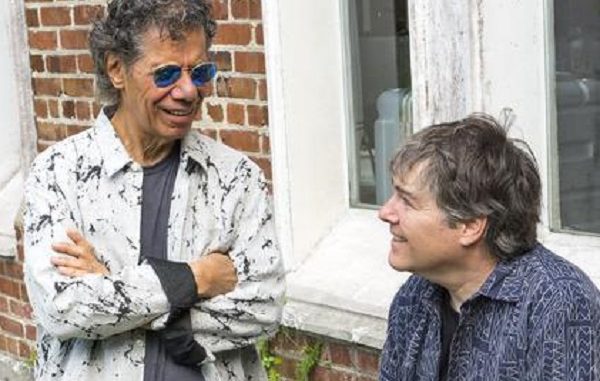
Welcome once more to a diverse selection of folk, and there’s some really unexpected artists sneaking into the topic this month. Expect some “Irish” folk, some brass bands and some strongly themed collections. Here we go…
 It seems a little unreasonable to criticise Angeline, Cohen & Jon (who are Angeline Morrison, Cohen Braithwaite-Kilcoyne and Jon Bickley) for over featuring a particular song – especially when the album ‘Grace Will Lead Me Home‘ is a themed celebration of the 300th birthday of John Newton, best known to posterity as the writer, 250 years ago, of ‘Amazing Grace.’ However, amongst the dozen songs on the album there are no less than five songs that directly reference ‘Amazing Grace‘ (such as ‘The President Sang Amazing Grace‘) or just are ‘Amazing Grace.’ It’s a dedication to a theme – and the referencing songs are by far the more interesting, especially if you’ve ever wondered that ‘Amazing Grace‘ is such a popular traditional song. The back story to its writing is, of course, incredible – John Newton went to sea young and worked on slave ships, was a slave himself for a while, later invested in slaves and then turned abolitionist and became an evangelical Anglican cleric. The songs vary between the very traditional and more modern folk-rock and some work better than others – the doo-wop of ‘Grace Will lead Me Home‘ is well sung but not convincing. An interesting concept album which works best when it reflects on the contradictions of John Newton’s life and how those same contradictions remain in today’s modern Britain (6/10).
It seems a little unreasonable to criticise Angeline, Cohen & Jon (who are Angeline Morrison, Cohen Braithwaite-Kilcoyne and Jon Bickley) for over featuring a particular song – especially when the album ‘Grace Will Lead Me Home‘ is a themed celebration of the 300th birthday of John Newton, best known to posterity as the writer, 250 years ago, of ‘Amazing Grace.’ However, amongst the dozen songs on the album there are no less than five songs that directly reference ‘Amazing Grace‘ (such as ‘The President Sang Amazing Grace‘) or just are ‘Amazing Grace.’ It’s a dedication to a theme – and the referencing songs are by far the more interesting, especially if you’ve ever wondered that ‘Amazing Grace‘ is such a popular traditional song. The back story to its writing is, of course, incredible – John Newton went to sea young and worked on slave ships, was a slave himself for a while, later invested in slaves and then turned abolitionist and became an evangelical Anglican cleric. The songs vary between the very traditional and more modern folk-rock and some work better than others – the doo-wop of ‘Grace Will lead Me Home‘ is well sung but not convincing. An interesting concept album which works best when it reflects on the contradictions of John Newton’s life and how those same contradictions remain in today’s modern Britain (6/10).
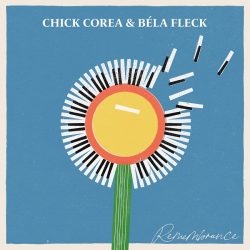 It may seem sometimes that there’s a deliberate attempt here to stretch the term folk as far as possible towards the breaking point…well, deliberate may be a strong word to use since it carries the wait of pre-meditation and careful planning. That being said, ‘Remembrance‘, the new album from Chick Corea and Béla Fleck does, maybe just a little bit, drift towards what an unbiased listener might call jazz. Ok, it’s a jazz album – but these last recordings from the amazing collaboration between the legendary pianist and the much lauded banjo player serve as an admirable coda to the partnership that led to a tour and album ‘The Enchantment’ way back in 2007. The music on ‘Remembrance‘ was recorded both live in concert, during the duo’s final tour dates in 2019, and via traded sound files, in the midst of the Covid pandemic – and shows a lively and imaginative interplay through mostly improvised pieces. So, Latin jazzy it might be in places, but it’s also a joy that’s well worth hearing (8/10).
It may seem sometimes that there’s a deliberate attempt here to stretch the term folk as far as possible towards the breaking point…well, deliberate may be a strong word to use since it carries the wait of pre-meditation and careful planning. That being said, ‘Remembrance‘, the new album from Chick Corea and Béla Fleck does, maybe just a little bit, drift towards what an unbiased listener might call jazz. Ok, it’s a jazz album – but these last recordings from the amazing collaboration between the legendary pianist and the much lauded banjo player serve as an admirable coda to the partnership that led to a tour and album ‘The Enchantment’ way back in 2007. The music on ‘Remembrance‘ was recorded both live in concert, during the duo’s final tour dates in 2019, and via traded sound files, in the midst of the Covid pandemic – and shows a lively and imaginative interplay through mostly improvised pieces. So, Latin jazzy it might be in places, but it’s also a joy that’s well worth hearing (8/10).
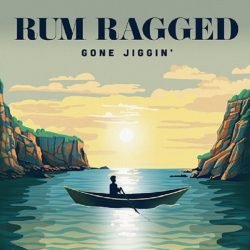 We’re on much more traditional ground with the latest release from Newfoundland’s Rum Ragged – whose ‘Gone Jiggin’‘ is a mixture of predominantly traditional songs and reels, with a few more modern but still very traditional sounding collaborations. The music is displaced Irish folk – a “modern” take with bouzouki and banjo as much to the fore as fiddle, bodhran, guitar, and button accordion. The songs are well sung and cover a range of emotions – sometimes when attempting humour as on ‘Riley‘ it risks falling a little flat to the modern ear – and the jigs and reels are high-spirited and high-energy as they should be. Overall a very solid release – not perhaps groundbreaking but certainly something you’d want to lend an ear to (7/10).
We’re on much more traditional ground with the latest release from Newfoundland’s Rum Ragged – whose ‘Gone Jiggin’‘ is a mixture of predominantly traditional songs and reels, with a few more modern but still very traditional sounding collaborations. The music is displaced Irish folk – a “modern” take with bouzouki and banjo as much to the fore as fiddle, bodhran, guitar, and button accordion. The songs are well sung and cover a range of emotions – sometimes when attempting humour as on ‘Riley‘ it risks falling a little flat to the modern ear – and the jigs and reels are high-spirited and high-energy as they should be. Overall a very solid release – not perhaps groundbreaking but certainly something you’d want to lend an ear to (7/10).
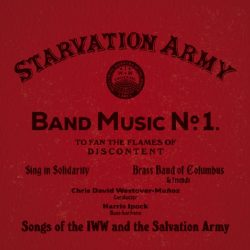 And mentioning humour, it is something that is vey much at the core of Starvation Army’s ‘Band Music No. 1 – Songs of the IWW and the Salvation Army’ which recreates the International Workers of the World’s riposte to the Salvation Army’s who had been hired to drown out the calls to strike and to spread a message of workers’ rights during IWW’s Spokane Free Speech fights of 1909. The IWW (popularly known as the Wobblies) successfully fought back with their own bands who played songs in support of the Union such as ‘Hallelujah (Hallelujah, I’m a Bum)‘ and also songs which satirised the Christian strike breakers who’d taken the bosses 30 pieces of silver such as ‘Nearer My Job To Thee.’ This new recorded collection features the Brass Band of Columbus together with New York Democratic Socialist choir Sing in Solidarity.
And mentioning humour, it is something that is vey much at the core of Starvation Army’s ‘Band Music No. 1 – Songs of the IWW and the Salvation Army’ which recreates the International Workers of the World’s riposte to the Salvation Army’s who had been hired to drown out the calls to strike and to spread a message of workers’ rights during IWW’s Spokane Free Speech fights of 1909. The IWW (popularly known as the Wobblies) successfully fought back with their own bands who played songs in support of the Union such as ‘Hallelujah (Hallelujah, I’m a Bum)‘ and also songs which satirised the Christian strike breakers who’d taken the bosses 30 pieces of silver such as ‘Nearer My Job To Thee.’ This new recorded collection features the Brass Band of Columbus together with New York Democratic Socialist choir Sing in Solidarity.
It’s an important reminder of one part of an historical labour battle, but the listener does have to ask themselves how much they enjoy the sound of a satirising of the trademark bang and clatter of the Salvation Army Band (6/10).
 If this is all starting sound too light-hearted then the self titled debut album from Irish duo Lemoncello (Claire Kinsella and Laura Quirke) provides a necessary corrective – with songs that are unflinching in their emotional honesty. The lead single ‘Dopamine‘ is that rare thing – an insightful look at the relationships that can be formed with one’s ‘phone, and the unhealthful forms this semi-addiction can take. It breaks the nearly universal truism that songs about looking at ‘phones are pretty awful. Elsewhere relationships with real people make a recurring theme – and these tend towards the emotionally unsettling or with a jaded eye for current or former partners. ‘Harsh Truths’ is hardly optimistic with swipes like “What are you afraid of? / Are you afraid that I might / Set your little stunted heart free / Held hostage for so long now,” it drips with bitterness. ‘All The Good Men‘ riffs on the theme of there being none left available with a Winter entanglement getting off to a stuttering start “I lit the fire / It’s easy started / Not so easy kept going / I always falter at the crucial decision / Put more fuel on it / Or just leave well alone?” before petering out unsatisfactorily “Why are all the good men / Too old, taken, or dead? / I let him up to bed / Blacken my heart / With a cigarette / Instead.” These are songs not easily forgotten, an impressive intimate modern folk sound documenting the many dissatisfactions of modern life and love (7/10).
If this is all starting sound too light-hearted then the self titled debut album from Irish duo Lemoncello (Claire Kinsella and Laura Quirke) provides a necessary corrective – with songs that are unflinching in their emotional honesty. The lead single ‘Dopamine‘ is that rare thing – an insightful look at the relationships that can be formed with one’s ‘phone, and the unhealthful forms this semi-addiction can take. It breaks the nearly universal truism that songs about looking at ‘phones are pretty awful. Elsewhere relationships with real people make a recurring theme – and these tend towards the emotionally unsettling or with a jaded eye for current or former partners. ‘Harsh Truths’ is hardly optimistic with swipes like “What are you afraid of? / Are you afraid that I might / Set your little stunted heart free / Held hostage for so long now,” it drips with bitterness. ‘All The Good Men‘ riffs on the theme of there being none left available with a Winter entanglement getting off to a stuttering start “I lit the fire / It’s easy started / Not so easy kept going / I always falter at the crucial decision / Put more fuel on it / Or just leave well alone?” before petering out unsatisfactorily “Why are all the good men / Too old, taken, or dead? / I let him up to bed / Blacken my heart / With a cigarette / Instead.” These are songs not easily forgotten, an impressive intimate modern folk sound documenting the many dissatisfactions of modern life and love (7/10).
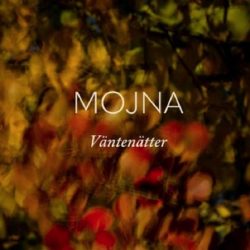 Last, but by no means least, is ‘Väntenätter‘, the latest album by Mojna – a Swedish/Norwegian trio, formerly known as Eriksson / Myhr / Malmström – which consists of Thomas Eriksson, Helga Myhr and Anna Malmström who make Nordic influenced folk on guitar, Hardanger fiddle, and clarinet/bass clarinet respectively. It makes for a distinctive combination – the light of the Hardanger fiddle with its four bowed and four resonant strings is nicely balanced against often darker clarinet notes with the guitar offering a balance between the two stitching the soundscape together with familiar fingerpicking. ‘Väntenätter’ translates as ‘Nights of waiting‘ and there’s certainly restraint and patience all through this beautiful instrumental album which also picks up notes of an East of Europe influence as well as fainter touches of jazz like improvisation. Meditative and gentle – and also quite unusual it’s an excellent and rewarding listen. (8/10)
Last, but by no means least, is ‘Väntenätter‘, the latest album by Mojna – a Swedish/Norwegian trio, formerly known as Eriksson / Myhr / Malmström – which consists of Thomas Eriksson, Helga Myhr and Anna Malmström who make Nordic influenced folk on guitar, Hardanger fiddle, and clarinet/bass clarinet respectively. It makes for a distinctive combination – the light of the Hardanger fiddle with its four bowed and four resonant strings is nicely balanced against often darker clarinet notes with the guitar offering a balance between the two stitching the soundscape together with familiar fingerpicking. ‘Väntenätter’ translates as ‘Nights of waiting‘ and there’s certainly restraint and patience all through this beautiful instrumental album which also picks up notes of an East of Europe influence as well as fainter touches of jazz like improvisation. Meditative and gentle – and also quite unusual it’s an excellent and rewarding listen. (8/10)


